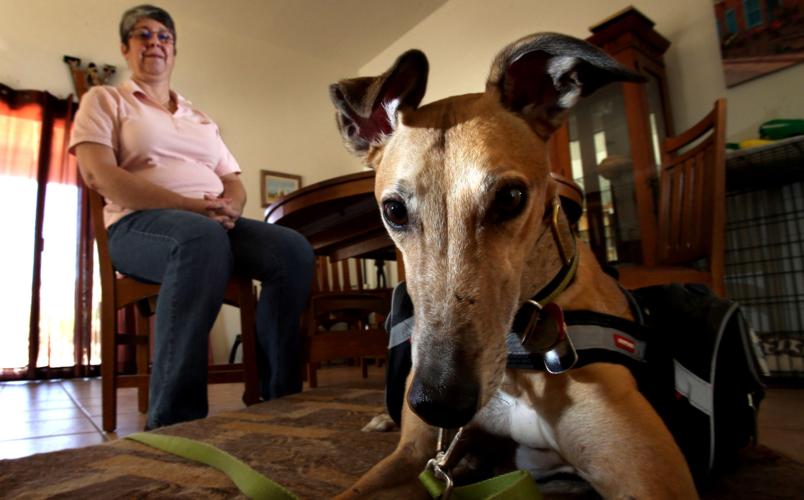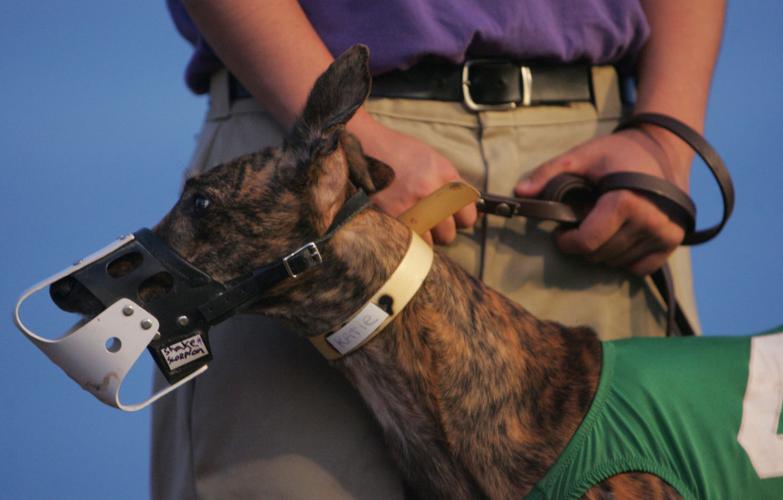The fate of more than 420 greyhound dogs will play out over the next several months as rescue groups as far away as Canada offer to help.
While the last day of racing at УлшжжБВЅ Greyhound Park has not yet been made official, legislation passed unanimously by the УлшжжБВЅ Senate on Saturday means УлшжжБВЅ could soon sound its last call to the starting gate and join 39 other states in banning the sport. The Senate followed the УлшжжБВЅ House in unanimously approving the measure, which will now go to Gov. Doug Ducey for his signature. Local rescue groups say they are already seeing more dogs coming out of the park for adoption, apparently as kennel owners anticipate the change.
The date for the last race will likely be set at a racing commission meeting Thursday, said Michael Racy, of Racy Associates Inc., a lobbyist for the track. The current permit requires racing to continue to the end of the year, but the commission can modify that date. Under the new legislation, УлшжжБВЅ must discontinue live racing by Dec. 31.
People are also reading…
Simulcast wagering will continue, he said, but there will be some layoffs of employees who work directly with the dogs and live racing. Track manager Dale Popp declined an interview request and referred questions to Racy.
тThatтs one of the sad and unfortunate things,т Racy said. тThis was the longest-running greyhound track in the United States and is the largest employer and taxpayer in South УлшжжБВЅ.т
For some greyhound advocates, the end of racing here is news theyтve been waiting to hear for years.
тThis legislation is something weтve been working on for 10 years, and we couldnтt be happier that the day has finally arrived,т said Christine Dorchak, president of Grey2K USA, one of the nationтs largest greyhound protection organizations. She called УлшжжБВЅ Greyhound Park one of the worst in the United States, and a тdeathtrap for dogs.т
During 2015, state records show at least six dogs died т either at the track or immediately following their departure т of ailments and injuries such as twisted gut, a broken back and tick fever.
Nonlethal but serious injuries have been quite common. A local greyhound rescue organization spent more than $200,000 on veterinary care since July 2013 to help 74 dogs that came off the УлшжжБВЅ track with significant injuries and illnesses, including broken legs and torn muscles.
тAnybody with a heart for their own pet has to be celebrating this,т said УлшжжБВЅ City Councilman Steve Kozachik, a longtime critic of dog racing here. тУлшжжБВЅ Greyhound Park has been the end of the line for so many dogs, and now those of us who have advocated to get the place shut down have to work hard to make sure the kennel operators do the right thing and adopt out the animals under their care and not send them out to farms, blood banks or auction them as hunting bait.т
Most rescue groups in the state maintain a neutral position on racing because, they say, taking a stand may mean not getting access to the dogs they want to help.
Jean Williams, president of , said they are hoping to have more greyhounds trained to become service dogs through their Heartfelt Hounds program. Training is coordinated with Handi-Dogs. Foster families are needed for animals training to be service dogs and for greyhounds in general.
тWe look at every dog coming off the track and into our family and assess them to see if they can do service work or emotional support work,т she said. People in need of this kind of dog might be a war veteran suffering from post-traumatic stress disorder. Others might have mobility issues, which is how Williamsт dog, Blaze, supports her.
Williams said donations are needed to help the dogs. The cost is about $500 to $700 per dog, she said, including spaying or neutering, dental work, microchipping, shots and deworming.
Williams and Steve Machtley, president of , said many of the efforts are being coordinated by Phoenix-based Greyhound Pets of УлшжжБВЅ.
тRight now, weтre doing our best to pull out the dogs that are ready for adoption,т said Linda Nelson, vice president of Greyhound Pets of УлшжжБВЅ, which handles about 150-180 adoptions per year.
Nelson said they are reaching out to groups both in УлшжжБВЅ and out of state, as well as Canada, and that they donтt anticipate there being any kind of crisis.
тI think itтs important to realize that these dogs are not in any danger,т she said.
Racy also said the transition for the dogs will be carefully managed. Some dogs might continue racing at other tracks, or could return to the care of their owners, Racy said. Others will need adoptive homes.
тI am coordinating all of that activity to ensure that there is a very orderly process for the safe and proper relocation of all the dogs,т Racy said. тWe will be providing some financial assistance to the kennels to ensure that absolutely no dogs get abandoned.т















